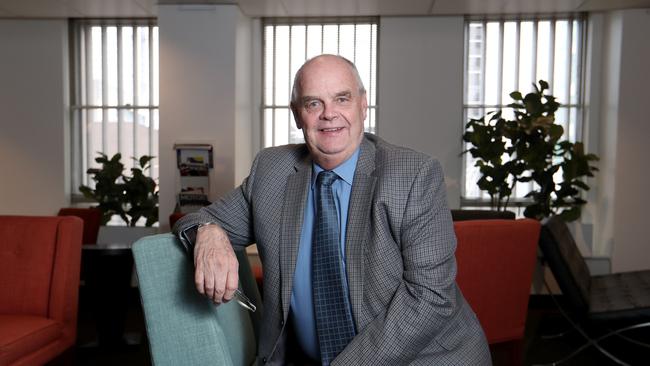Technology will change the competitive landscape for universities

The pathway to success for disrupters revolves around customer-focused innovation. The complexity of search is simplified, customer choice is widened and costs are lower. The customer experience is improved. The customers and the new suppliers win out.
To date, the teaching side of universities has largely sidestepped major innovation. The pedagogic model of lectures, tutorials, assignments and assessments has fundamentally remained unchanged for a century or more. Student learning preferences have evolved. Technology has dramatically advanced. Information that students need is now at their fingertips not locked away in libraries. Amid this change, the university teaching experience, which impacts hugely on the student learning experience, has, with relatively few exceptions, fundamentally remained the same.
Profound change is upon us. Traditionally, the key factors for university selection by domestic students are — reputation, geographic location (that is, physical proximity to campus), and accessibility to the course of interest. For foreign students, cost and country of choice are additional factors. Technology has the potential to remove the geographic barrier to selection, both nationally, and, under some conditions, internationally.
In this technologically-enabled world, the competitive landscape for student enrolments could move from local to global. Both Australian and international students will have a level of choice of institution as never before. Many will forgo the on-campus experience to widen their choice set. These students will make their selection of institution based on university reputation and the quality of their expected learning experience. Universities will need to find a response to this because students will have added the learning experience to their criteria list. They will value experiences that are richer and more actively engaging than the simply shifting lectures and tutorials to ‘online’ mode.

As it is recognised, this will lead to accelerated levels of innovation in the learner experience. The paradigm will move from the traditional “what will I teach” model, to the more innovative, “what will the learner experience be?” The teacher-led or instructor centric model of lectures and tutorials of the past and present will remain important for only some courses.
Technology places power in the hands of consumers. For example, millions of travellers are influenced by the reviews published on TripAdvisor. The experiences of others powerfully affects contemporary consumer choice. Feedback has forced the hospitality industry to raise their game to meet customer expectations on experience. This is at odds with contemporary Australian higher education where the quality of the education is publicly signalled only by a single data point –— the course entry score.
In the new competitive landscape, there will be university review sites, populated by student experience reviews. Students will communicate and influence student choice both nationally and internationally. The student feedback is likely to force universities to focus more acutely on the learning experience as seen through student eyes.
In this boundary-less competitive landscape, competition will focus more acutely on the learner experience. Innovation in the learner experience as seen by the student consumer will be critical.
At a policy level, the government has the opportunity to create a funding and regulatory environment for Australia’s universities to build the capabilities in this new competitive landscape adding to their world reputation. The investment here is not insignificant; neither are internal institutional barriers.
There will be winners and there will be losers. Both at a domestic and global level, we are facing a burning platform. The biggest winners will be those which move quickly to deliver rich digitally delivered student experiences where relevant.
The campus university experience will never go away. This experience will remain a coveted ‘rite of passage’ for many school leavers seeking to leave home as a prize of high school graduation. However, the cloud will become crucial in the educational experience. School leavers are just one of a number of ‘learner types’ or ‘learner personas’ who need to be catered for. These include mature age learners, overseas students, regional and remote learners, part-time students and those seeking online micro-credentials.
A final note on what could be on the horizon. We speak of the “Uber-effect” where industries have been disrupted by technology-driven “intruders”. It is not entirely inconceivable that a progressive elite institution (maybe an institution like Stanford) partners up with a technology giant (perhaps Google) to set up the ‘Stanford/Google University’. Just ten minutes apart in the Bay area south of San Francisco, each of these example organisations bring expertise and gravitas to such a union. The resultant inevitable change in innovation and in the student learning experience would have global implications. The disputation could be huge and the competitive landscape forever different. In world of tomorrow (and it may literally be tomorrow), this may be possible — and with regulatory recognition, increasingly likely.
Is the above fanciful discourse? If we accept that the Uber and AirBnB effects can apply to the university sector, then we will understand that there are opportunities and threats that have emerged from the pandemic’s disruption. The only question to be answered is: will Australian universities be leaders or followers?
Keith Houghton is chief academic strategist of the Higher Education and Research Group and a former Dean of Business and Economics at the Australian National University.
George Aveling is chief executive officer of Elementrix an Asian-based digital learning consultancy.



Technology has been a great enabler and huge disrupter. Uber turned the taxi industry upside down worldwide. AirBnb has disrupted the accommodation industry. Online travel booking options have disrupted the livelihoods of travel agents.